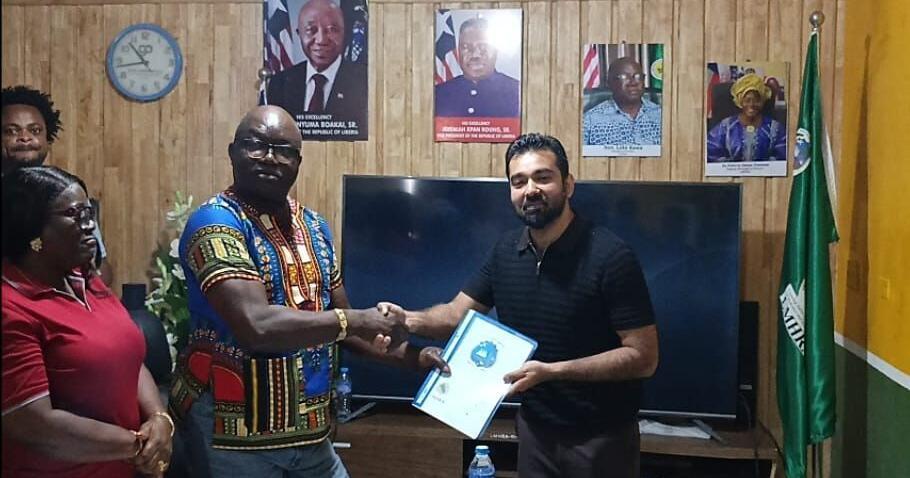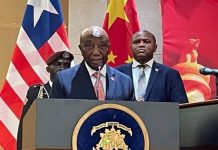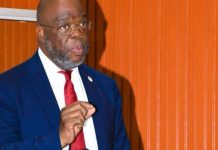Africa-Press – Liberia. In a transformative move poised to reshape Liberia’s pharmaceutical safety landscape, the Liberia Medicines and Health Products Regulatory Authority (LMHRA) has signed a US$9 million Public-Private Partnership (PPP) with Quality Management Solutions (QMS) to overhaul the country’s stalled and under-resourced medicines testing system.
The agreement—signed on Friday, November 21, 2025, at the LMHRA headquarters in Mamba Point—will fund the construction of an ultra-modern, ISO-compliant Quality Control Laboratory, a facility expected to bring Liberia closer to WHO Maturity Level 3, a status the country has failed to achieve for decades.
Liberia’s health sector has faced years of systemic weakness, aggravated by a market flooded with fake, substandard, and expired drugs. For decades, regulatory authorities have lacked the tools to test medicine potency, detect impurities, or authenticate products—a situation that has endangered patients and overwhelmed an already burdened healthcare system.
According to the LMHRA, over 40% of medicines on the Liberian market are believed to be substandard, counterfeit, improperly stored, or illegally imported. These products contribute to avoidable deaths, treatment failures, antimicrobial resistance, and a growing public distrust in the health system.
The existing LMHRA laboratory operates with minimal capacity—limited largely to visual inspections, physical checks, and basic screening. Unstable electricity, lack of modern equipment, outdated reagents, insufficiently trained staff, and the absence of international accreditation have combined to create a regulatory vacuum.
As a result, Liberia has long relied on expensive third-country testing—a cost many private importers avoid, allowing substandard drugs to circulate unchecked.
“We Are at a Breaking Point”
At the inception meeting, Dr. Luke Bawo, Managing Director of the LMHRA, offered a sobering assessment of the current health commodity environment.
“We cannot authenticate the quality of commodities in circulation,” he said. “Currently, we can only conduct visual and physical testing. We cannot determine impurities in products or authenticate if a commodity is at a particular strength.”
Dr. Bawo described the new agreement as a “big leap” for the sector, while acknowledging that Liberia’s inability to verify the medicines it imports has placed the country’s healthcare delivery “at a breaking point.”
“The quality of any health system is directly dependent on the quality of commodities in circulation,” he stressed. “This partnership marks a new day. We are resolved that within two years, we will attain the necessary global qualifications.”
Under the newly signed PPP framework, QMS will invest, operate, and recover its capital through a revenue-sharing arrangement, 65% of revenues to QMS, 35% to the Government of Liberia (LMHRA). The model ensures government oversight while leveraging private-sector efficiency and financing.
Shoaib Mirza, General Manager of QMS, outlined an ambitious plan to transform the LMHRA lab into a modernized testing hub with the capacity to analyze, Pharmaceuticals, Medical consumables, Food and beverages, Animal feed, Petroleum products, and Sanitization chemicals.
“We will implement a Quality Management System that ensures the lab is legally identifiable, impartial, and consistent,” Mirza said.
He also promised quick turnaround times for test reports—between 15 to 30 days—and extensive training for LMHRA personnel to operate sophisticated instruments.
“It is a joy to work with the LMHRA in efforts to clean and clear Liberia of harmful medicines,” he added.
Dr. Bawo emphasized that the signing follows more than a year of due diligence, including reviews and approvals from multiple government bodies, the Executive, Public Procurement and Concession Commission (PPCC), Concession Committee of the Ministry of Finance & Development Planning, National Investment Commission (NIC), and Ministry of Justice (MOJ).
“We insisted on doing everything the right way,” Dr. Bawo said. “We have received the official approval to modernize this laboratory, and despite distractions, we are headed in the right direction.”
Dr. Patricia Quaye-Freeman, Deputy Managing Director of the LMHRA, described the partnership as a defining moment for pharmaceutical regulation.
“Together, we have the opportunity to build a facility that will serve as a model of excellence in quality assurance,” she said, urging transparency and collaboration during implementation.
A New Era of Market Surveillance
Once completed, the upgraded facility will introduce advanced mechanisms such as, QR-coding of imported medicines, Real-time tracking of medical products, Aggressive market cleanup, and stricter post-market surveillance to curb the influx of dangerous medicines.
A grand commissioning ceremony is expected in four months, following renovation and equipment installation.
The initiative is truly necessary reform for a vulnerable healthcare system. Liberia’s struggle with counterfeit and substandard medicines has deep historical roots. Weak borders, low regulatory enforcement, limited laboratory capacity, and high demand for low-cost drugs have created a thriving market for unsafe pharmaceutical products.
The 2014 Ebola epidemic and the COVID-19 pandemic further exposed gaps in the country’s health infrastructure and the dangerous consequences of an unregulated medicine supply chain.
The new LMHRA–QMS partnership presents one of Liberia’s most promising institutional reforms in decades. If implemented effectively, it could standardize medicine quality, reduce mortality linked to fake drugs, strengthen patient confidence, attract pharmaceutical investments, and improve the country’s ranking in global regulatory indices.
For a country still rebuilding its health system, the initiative represents not just a laboratory upgrade, but a pivotal step toward safeguarding public health and restoring trust in medical care.
The US$9 million laboratory modernization agreement marks a bold shift toward scientific rigor, regulatory enforcement, and consumer safety, the LMHRA management noted. If fully realized, it will position Liberia among West African nations with credible medicine-testing capabilities and significantly reduce the circulation of harmful pharmaceuticals.
For the LMHRA and the health sector at large, the message is clear: Liberia is finally taking decisive steps to protect its people from the threats of counterfeit and substandard medicines.
For More News And Analysis About Liberia Follow Africa-Press






